Customer Satisfaction Strategies in the Thai Hotel Industry
VerifiedAdded on 2020/07/23
|71
|30781
|41
Report
AI Summary
This report examines strategies to boost customer satisfaction within the hotel industry of Thailand. It begins by establishing the research background, economic and technological trends, and the relationship between tourism and hospitality. The importance of customer satisfaction is emphasized, along with the aim and objectives of the research. A literature review covers competitive hotel industries, effective strategies, the growth of competition in Thailand, Total Quality Management (TQM), Service Quality (SERVQUAL), and customer satisfaction frameworks. The methodology section details the research approach, questions, and the use of qualitative research methods, including data collection and analysis through thematic analysis of interviews. The findings highlight key themes related to service quality, TQM, SERVQUAL, and recommendations for improving service delivery, such as employee training and technological upgrades. The conclusion and recommendations provide insights for hotels to enhance their service offerings and overall customer experience. The report also includes a statement of confidentiality, acknowledgements, an abstract, and a glossary.
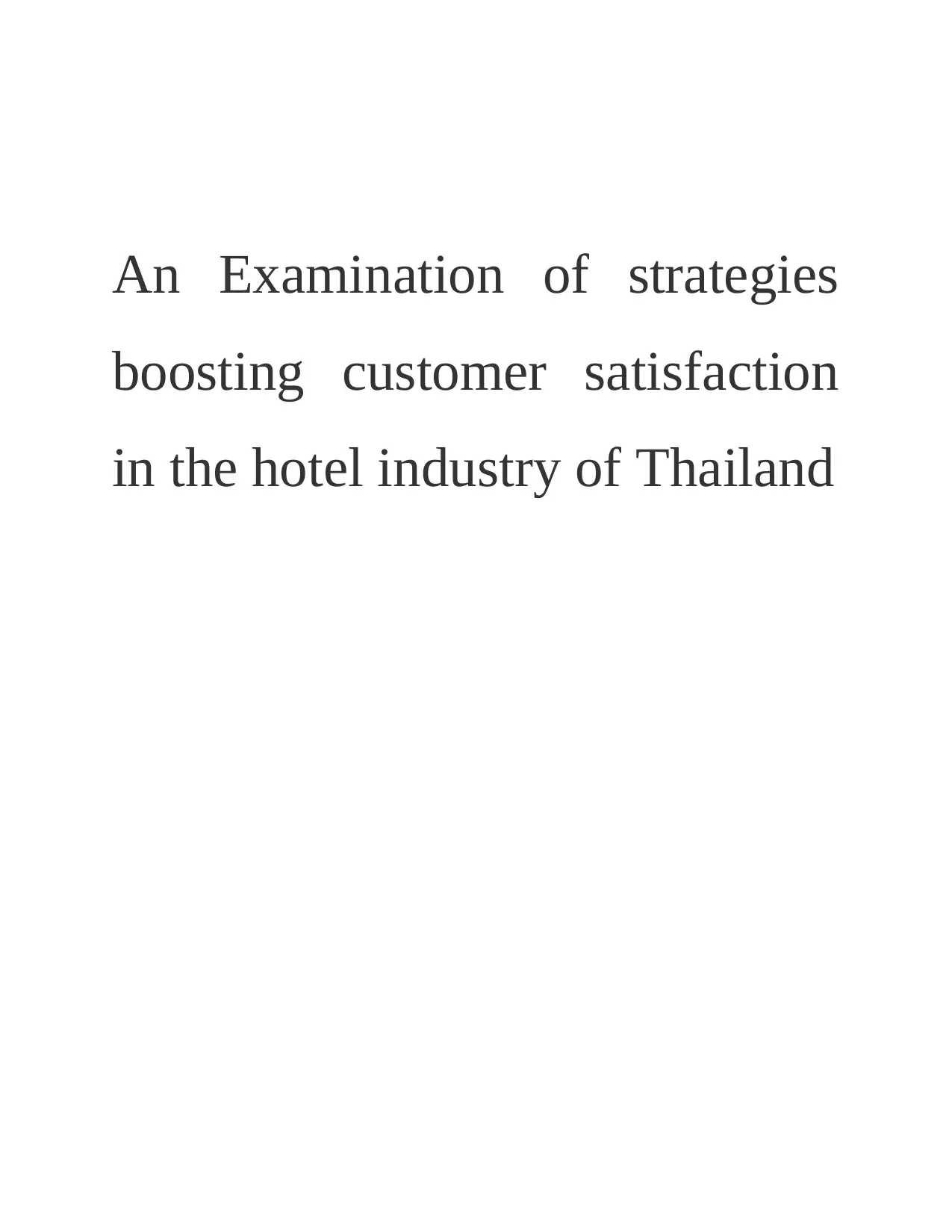
An Examination of strategies
boosting customer satisfaction
in the hotel industry of Thailand
boosting customer satisfaction
in the hotel industry of Thailand
Paraphrase This Document
Need a fresh take? Get an instant paraphrase of this document with our AI Paraphraser
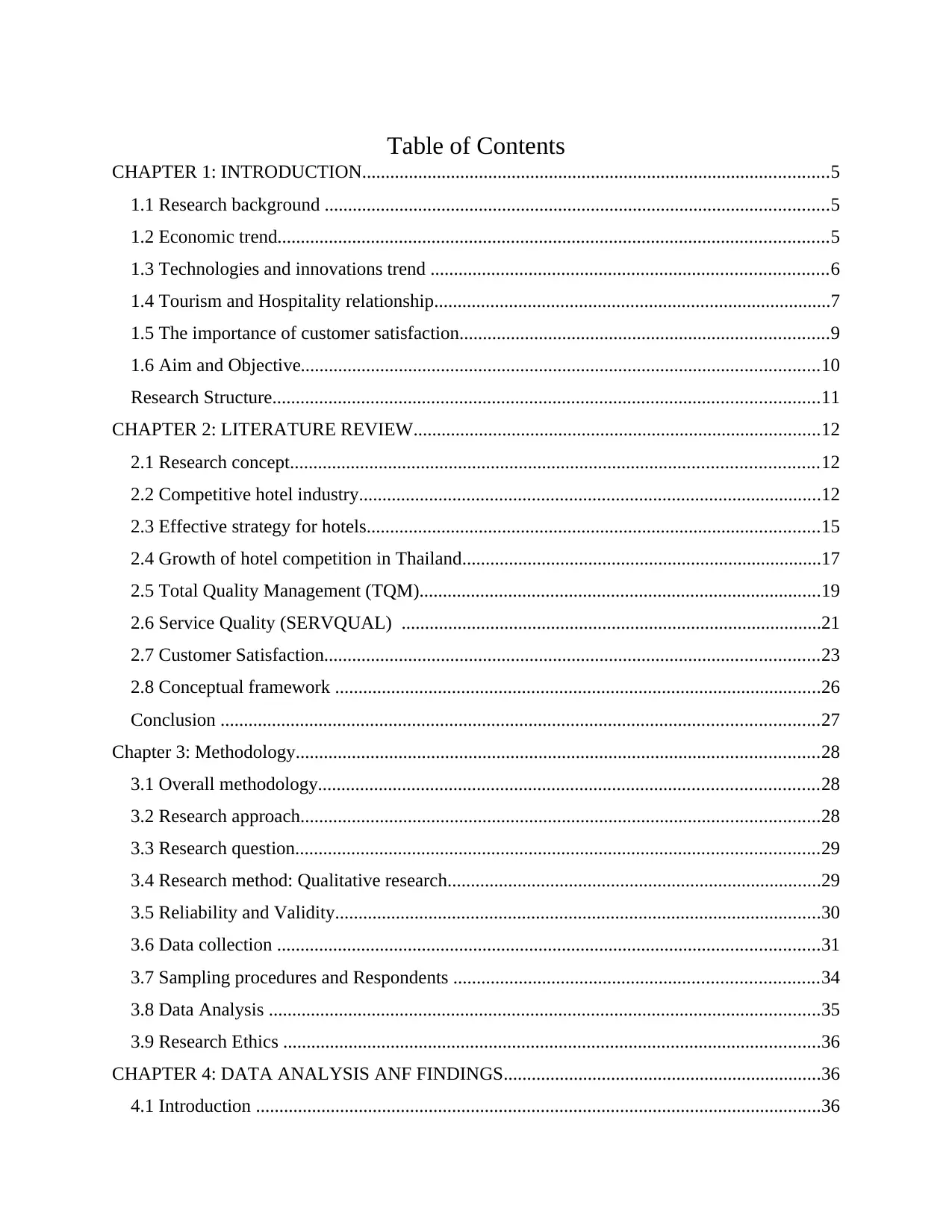
Table of Contents
CHAPTER 1: INTRODUCTION....................................................................................................5
1.1 Research background ............................................................................................................5
1.2 Economic trend......................................................................................................................5
1.3 Technologies and innovations trend .....................................................................................6
1.4 Tourism and Hospitality relationship.....................................................................................7
1.5 The importance of customer satisfaction...............................................................................9
1.6 Aim and Objective...............................................................................................................10
Research Structure.....................................................................................................................11
CHAPTER 2: LITERATURE REVIEW.......................................................................................12
2.1 Research concept.................................................................................................................12
2.2 Competitive hotel industry...................................................................................................12
2.3 Effective strategy for hotels.................................................................................................15
2.4 Growth of hotel competition in Thailand.............................................................................17
2.5 Total Quality Management (TQM)......................................................................................19
2.6 Service Quality (SERVQUAL) ..........................................................................................21
2.7 Customer Satisfaction..........................................................................................................23
2.8 Conceptual framework ........................................................................................................26
Conclusion ................................................................................................................................27
Chapter 3: Methodology................................................................................................................28
3.1 Overall methodology...........................................................................................................28
3.2 Research approach...............................................................................................................28
3.3 Research question................................................................................................................29
3.4 Research method: Qualitative research................................................................................29
3.5 Reliability and Validity........................................................................................................30
3.6 Data collection ....................................................................................................................31
3.7 Sampling procedures and Respondents ..............................................................................34
3.8 Data Analysis ......................................................................................................................35
3.9 Research Ethics ...................................................................................................................36
CHAPTER 4: DATA ANALYSIS ANF FINDINGS....................................................................36
4.1 Introduction .........................................................................................................................36
CHAPTER 1: INTRODUCTION....................................................................................................5
1.1 Research background ............................................................................................................5
1.2 Economic trend......................................................................................................................5
1.3 Technologies and innovations trend .....................................................................................6
1.4 Tourism and Hospitality relationship.....................................................................................7
1.5 The importance of customer satisfaction...............................................................................9
1.6 Aim and Objective...............................................................................................................10
Research Structure.....................................................................................................................11
CHAPTER 2: LITERATURE REVIEW.......................................................................................12
2.1 Research concept.................................................................................................................12
2.2 Competitive hotel industry...................................................................................................12
2.3 Effective strategy for hotels.................................................................................................15
2.4 Growth of hotel competition in Thailand.............................................................................17
2.5 Total Quality Management (TQM)......................................................................................19
2.6 Service Quality (SERVQUAL) ..........................................................................................21
2.7 Customer Satisfaction..........................................................................................................23
2.8 Conceptual framework ........................................................................................................26
Conclusion ................................................................................................................................27
Chapter 3: Methodology................................................................................................................28
3.1 Overall methodology...........................................................................................................28
3.2 Research approach...............................................................................................................28
3.3 Research question................................................................................................................29
3.4 Research method: Qualitative research................................................................................29
3.5 Reliability and Validity........................................................................................................30
3.6 Data collection ....................................................................................................................31
3.7 Sampling procedures and Respondents ..............................................................................34
3.8 Data Analysis ......................................................................................................................35
3.9 Research Ethics ...................................................................................................................36
CHAPTER 4: DATA ANALYSIS ANF FINDINGS....................................................................36
4.1 Introduction .........................................................................................................................36
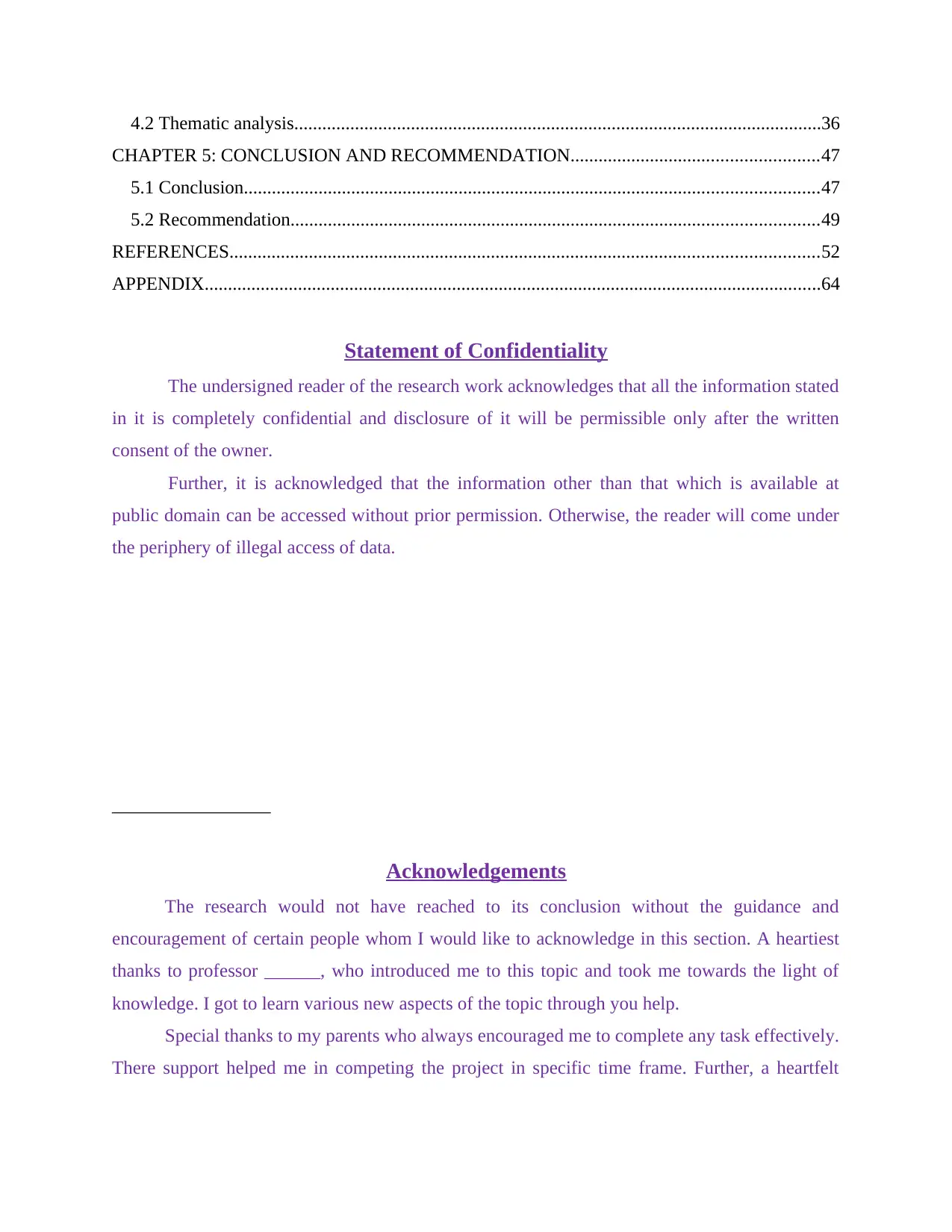
4.2 Thematic analysis.................................................................................................................36
CHAPTER 5: CONCLUSION AND RECOMMENDATION.....................................................47
5.1 Conclusion...........................................................................................................................47
5.2 Recommendation.................................................................................................................49
REFERENCES..............................................................................................................................52
APPENDIX....................................................................................................................................64
Statement of Confidentiality
The undersigned reader of the research work acknowledges that all the information stated
in it is completely confidential and disclosure of it will be permissible only after the written
consent of the owner.
Further, it is acknowledged that the information other than that which is available at
public domain can be accessed without prior permission. Otherwise, the reader will come under
the periphery of illegal access of data.
_________________
Acknowledgements
The research would not have reached to its conclusion without the guidance and
encouragement of certain people whom I would like to acknowledge in this section. A heartiest
thanks to professor ______, who introduced me to this topic and took me towards the light of
knowledge. I got to learn various new aspects of the topic through you help.
Special thanks to my parents who always encouraged me to complete any task effectively.
There support helped me in competing the project in specific time frame. Further, a heartfelt
CHAPTER 5: CONCLUSION AND RECOMMENDATION.....................................................47
5.1 Conclusion...........................................................................................................................47
5.2 Recommendation.................................................................................................................49
REFERENCES..............................................................................................................................52
APPENDIX....................................................................................................................................64
Statement of Confidentiality
The undersigned reader of the research work acknowledges that all the information stated
in it is completely confidential and disclosure of it will be permissible only after the written
consent of the owner.
Further, it is acknowledged that the information other than that which is available at
public domain can be accessed without prior permission. Otherwise, the reader will come under
the periphery of illegal access of data.
_________________
Acknowledgements
The research would not have reached to its conclusion without the guidance and
encouragement of certain people whom I would like to acknowledge in this section. A heartiest
thanks to professor ______, who introduced me to this topic and took me towards the light of
knowledge. I got to learn various new aspects of the topic through you help.
Special thanks to my parents who always encouraged me to complete any task effectively.
There support helped me in competing the project in specific time frame. Further, a heartfelt
⊘ This is a preview!⊘
Do you want full access?
Subscribe today to unlock all pages.

Trusted by 1+ million students worldwide
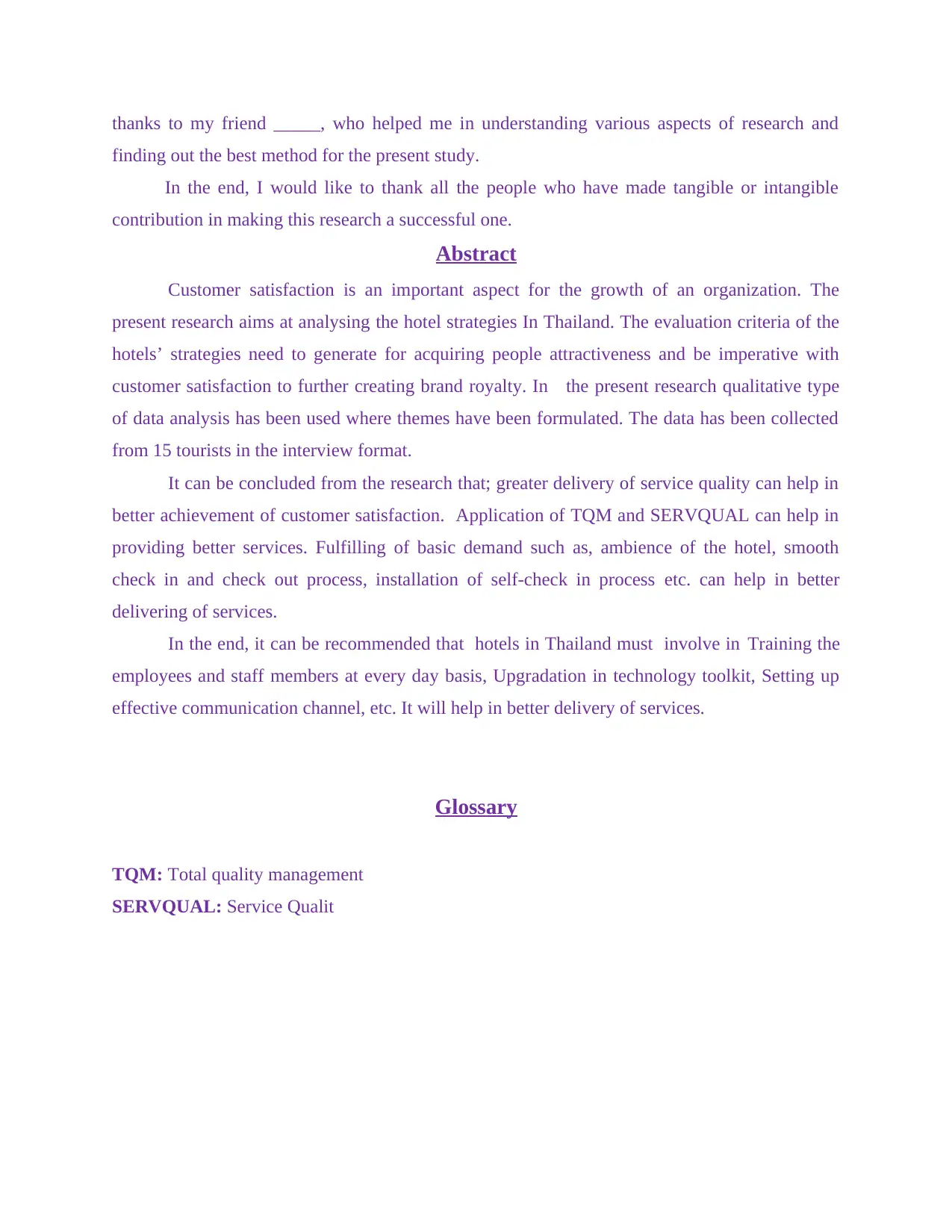
thanks to my friend _____, who helped me in understanding various aspects of research and
finding out the best method for the present study.
In the end, I would like to thank all the people who have made tangible or intangible
contribution in making this research a successful one.
Abstract
Customer satisfaction is an important aspect for the growth of an organization. The
present research aims at analysing the hotel strategies In Thailand. The evaluation criteria of the
hotels’ strategies need to generate for acquiring people attractiveness and be imperative with
customer satisfaction to further creating brand royalty. In the present research qualitative type
of data analysis has been used where themes have been formulated. The data has been collected
from 15 tourists in the interview format.
It can be concluded from the research that; greater delivery of service quality can help in
better achievement of customer satisfaction. Application of TQM and SERVQUAL can help in
providing better services. Fulfilling of basic demand such as, ambience of the hotel, smooth
check in and check out process, installation of self-check in process etc. can help in better
delivering of services.
In the end, it can be recommended that hotels in Thailand must involve in Training the
employees and staff members at every day basis, Upgradation in technology toolkit, Setting up
effective communication channel, etc. It will help in better delivery of services.
Glossary
TQM: Total quality management
SERVQUAL: Service Qualit
finding out the best method for the present study.
In the end, I would like to thank all the people who have made tangible or intangible
contribution in making this research a successful one.
Abstract
Customer satisfaction is an important aspect for the growth of an organization. The
present research aims at analysing the hotel strategies In Thailand. The evaluation criteria of the
hotels’ strategies need to generate for acquiring people attractiveness and be imperative with
customer satisfaction to further creating brand royalty. In the present research qualitative type
of data analysis has been used where themes have been formulated. The data has been collected
from 15 tourists in the interview format.
It can be concluded from the research that; greater delivery of service quality can help in
better achievement of customer satisfaction. Application of TQM and SERVQUAL can help in
providing better services. Fulfilling of basic demand such as, ambience of the hotel, smooth
check in and check out process, installation of self-check in process etc. can help in better
delivering of services.
In the end, it can be recommended that hotels in Thailand must involve in Training the
employees and staff members at every day basis, Upgradation in technology toolkit, Setting up
effective communication channel, etc. It will help in better delivery of services.
Glossary
TQM: Total quality management
SERVQUAL: Service Qualit
Paraphrase This Document
Need a fresh take? Get an instant paraphrase of this document with our AI Paraphraser
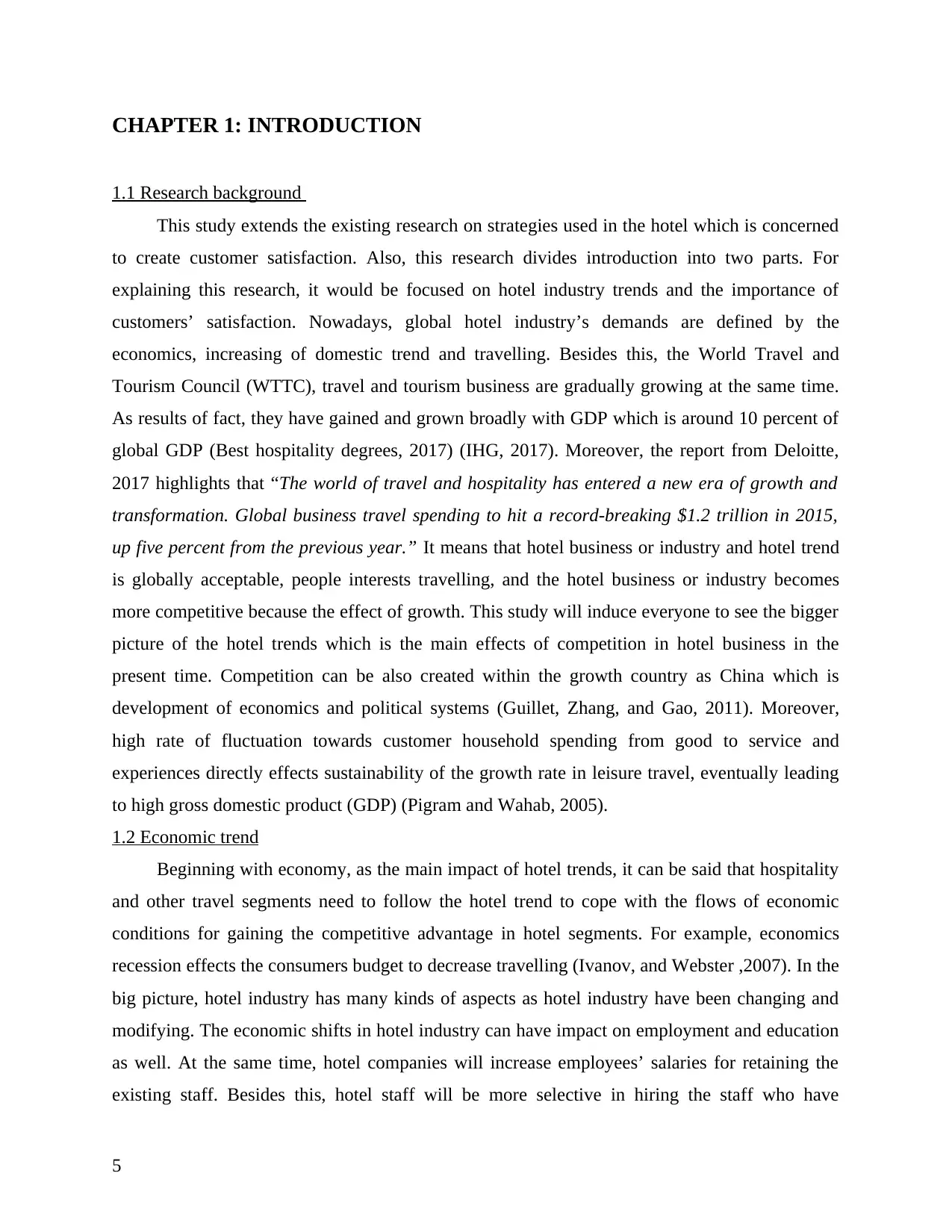
CHAPTER 1: INTRODUCTION
1.1 Research background
This study extends the existing research on strategies used in the hotel which is concerned
to create customer satisfaction. Also, this research divides introduction into two parts. For
explaining this research, it would be focused on hotel industry trends and the importance of
customers’ satisfaction. Nowadays, global hotel industry’s demands are defined by the
economics, increasing of domestic trend and travelling. Besides this, the World Travel and
Tourism Council (WTTC), travel and tourism business are gradually growing at the same time.
As results of fact, they have gained and grown broadly with GDP which is around 10 percent of
global GDP (Best hospitality degrees, 2017) (IHG, 2017). Moreover, the report from Deloitte,
2017 highlights that “The world of travel and hospitality has entered a new era of growth and
transformation. Global business travel spending to hit a record-breaking $1.2 trillion in 2015,
up five percent from the previous year.” It means that hotel business or industry and hotel trend
is globally acceptable, people interests travelling, and the hotel business or industry becomes
more competitive because the effect of growth. This study will induce everyone to see the bigger
picture of the hotel trends which is the main effects of competition in hotel business in the
present time. Competition can be also created within the growth country as China which is
development of economics and political systems (Guillet, Zhang, and Gao, 2011). Moreover,
high rate of fluctuation towards customer household spending from good to service and
experiences directly effects sustainability of the growth rate in leisure travel, eventually leading
to high gross domestic product (GDP) (Pigram and Wahab, 2005).
1.2 Economic trend
Beginning with economy, as the main impact of hotel trends, it can be said that hospitality
and other travel segments need to follow the hotel trend to cope with the flows of economic
conditions for gaining the competitive advantage in hotel segments. For example, economics
recession effects the consumers budget to decrease travelling (Ivanov, and Webster ,2007). In the
big picture, hotel industry has many kinds of aspects as hotel industry have been changing and
modifying. The economic shifts in hotel industry can have impact on employment and education
as well. At the same time, hotel companies will increase employees’ salaries for retaining the
existing staff. Besides this, hotel staff will be more selective in hiring the staff who have
5
1.1 Research background
This study extends the existing research on strategies used in the hotel which is concerned
to create customer satisfaction. Also, this research divides introduction into two parts. For
explaining this research, it would be focused on hotel industry trends and the importance of
customers’ satisfaction. Nowadays, global hotel industry’s demands are defined by the
economics, increasing of domestic trend and travelling. Besides this, the World Travel and
Tourism Council (WTTC), travel and tourism business are gradually growing at the same time.
As results of fact, they have gained and grown broadly with GDP which is around 10 percent of
global GDP (Best hospitality degrees, 2017) (IHG, 2017). Moreover, the report from Deloitte,
2017 highlights that “The world of travel and hospitality has entered a new era of growth and
transformation. Global business travel spending to hit a record-breaking $1.2 trillion in 2015,
up five percent from the previous year.” It means that hotel business or industry and hotel trend
is globally acceptable, people interests travelling, and the hotel business or industry becomes
more competitive because the effect of growth. This study will induce everyone to see the bigger
picture of the hotel trends which is the main effects of competition in hotel business in the
present time. Competition can be also created within the growth country as China which is
development of economics and political systems (Guillet, Zhang, and Gao, 2011). Moreover,
high rate of fluctuation towards customer household spending from good to service and
experiences directly effects sustainability of the growth rate in leisure travel, eventually leading
to high gross domestic product (GDP) (Pigram and Wahab, 2005).
1.2 Economic trend
Beginning with economy, as the main impact of hotel trends, it can be said that hospitality
and other travel segments need to follow the hotel trend to cope with the flows of economic
conditions for gaining the competitive advantage in hotel segments. For example, economics
recession effects the consumers budget to decrease travelling (Ivanov, and Webster ,2007). In the
big picture, hotel industry has many kinds of aspects as hotel industry have been changing and
modifying. The economic shifts in hotel industry can have impact on employment and education
as well. At the same time, hotel companies will increase employees’ salaries for retaining the
existing staff. Besides this, hotel staff will be more selective in hiring the staff who have
5
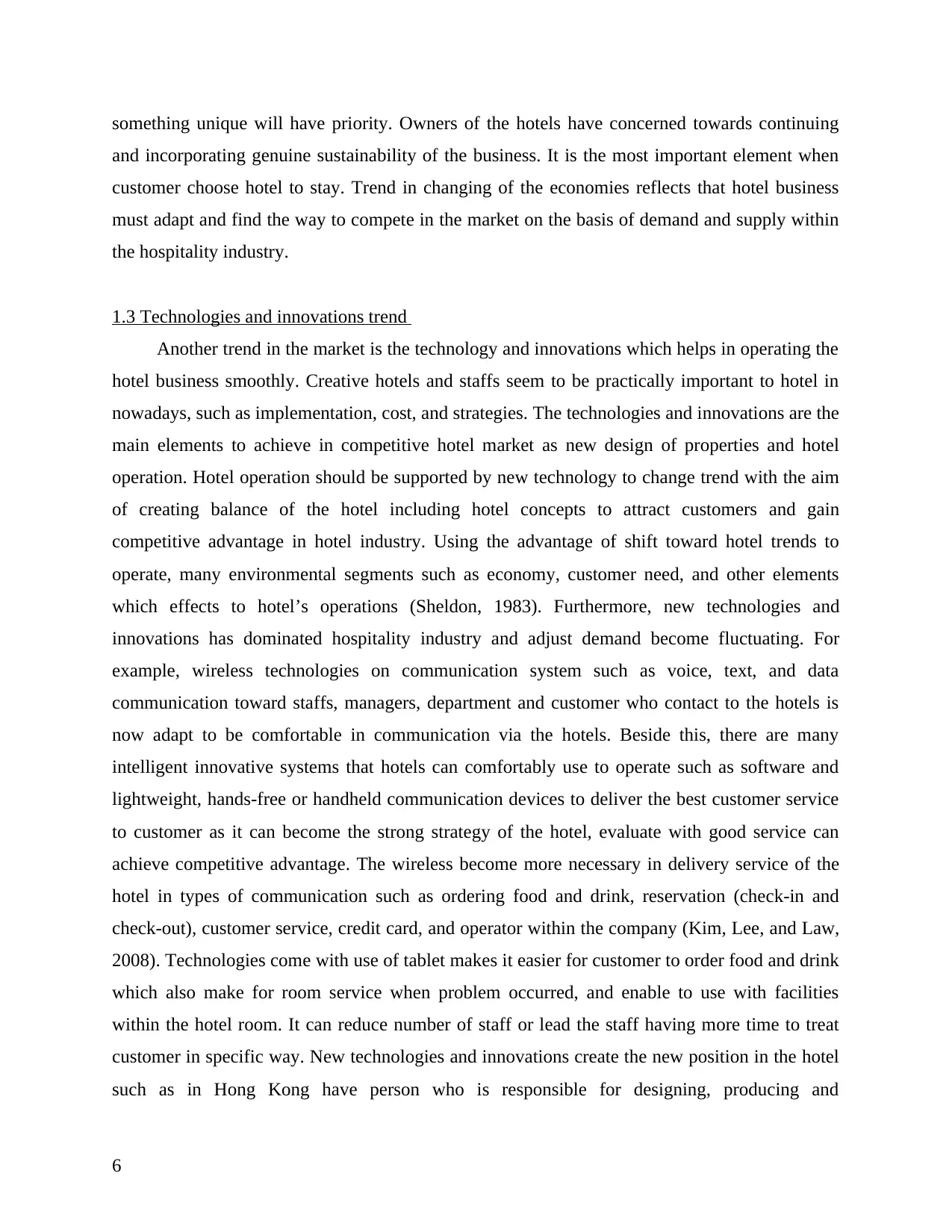
something unique will have priority. Owners of the hotels have concerned towards continuing
and incorporating genuine sustainability of the business. It is the most important element when
customer choose hotel to stay. Trend in changing of the economies reflects that hotel business
must adapt and find the way to compete in the market on the basis of demand and supply within
the hospitality industry.
1.3 Technologies and innovations trend
Another trend in the market is the technology and innovations which helps in operating the
hotel business smoothly. Creative hotels and staffs seem to be practically important to hotel in
nowadays, such as implementation, cost, and strategies. The technologies and innovations are the
main elements to achieve in competitive hotel market as new design of properties and hotel
operation. Hotel operation should be supported by new technology to change trend with the aim
of creating balance of the hotel including hotel concepts to attract customers and gain
competitive advantage in hotel industry. Using the advantage of shift toward hotel trends to
operate, many environmental segments such as economy, customer need, and other elements
which effects to hotel’s operations (Sheldon, 1983). Furthermore, new technologies and
innovations has dominated hospitality industry and adjust demand become fluctuating. For
example, wireless technologies on communication system such as voice, text, and data
communication toward staffs, managers, department and customer who contact to the hotels is
now adapt to be comfortable in communication via the hotels. Beside this, there are many
intelligent innovative systems that hotels can comfortably use to operate such as software and
lightweight, hands-free or handheld communication devices to deliver the best customer service
to customer as it can become the strong strategy of the hotel, evaluate with good service can
achieve competitive advantage. The wireless become more necessary in delivery service of the
hotel in types of communication such as ordering food and drink, reservation (check-in and
check-out), customer service, credit card, and operator within the company (Kim, Lee, and Law,
2008). Technologies come with use of tablet makes it easier for customer to order food and drink
which also make for room service when problem occurred, and enable to use with facilities
within the hotel room. It can reduce number of staff or lead the staff having more time to treat
customer in specific way. New technologies and innovations create the new position in the hotel
such as in Hong Kong have person who is responsible for designing, producing and
6
and incorporating genuine sustainability of the business. It is the most important element when
customer choose hotel to stay. Trend in changing of the economies reflects that hotel business
must adapt and find the way to compete in the market on the basis of demand and supply within
the hospitality industry.
1.3 Technologies and innovations trend
Another trend in the market is the technology and innovations which helps in operating the
hotel business smoothly. Creative hotels and staffs seem to be practically important to hotel in
nowadays, such as implementation, cost, and strategies. The technologies and innovations are the
main elements to achieve in competitive hotel market as new design of properties and hotel
operation. Hotel operation should be supported by new technology to change trend with the aim
of creating balance of the hotel including hotel concepts to attract customers and gain
competitive advantage in hotel industry. Using the advantage of shift toward hotel trends to
operate, many environmental segments such as economy, customer need, and other elements
which effects to hotel’s operations (Sheldon, 1983). Furthermore, new technologies and
innovations has dominated hospitality industry and adjust demand become fluctuating. For
example, wireless technologies on communication system such as voice, text, and data
communication toward staffs, managers, department and customer who contact to the hotels is
now adapt to be comfortable in communication via the hotels. Beside this, there are many
intelligent innovative systems that hotels can comfortably use to operate such as software and
lightweight, hands-free or handheld communication devices to deliver the best customer service
to customer as it can become the strong strategy of the hotel, evaluate with good service can
achieve competitive advantage. The wireless become more necessary in delivery service of the
hotel in types of communication such as ordering food and drink, reservation (check-in and
check-out), customer service, credit card, and operator within the company (Kim, Lee, and Law,
2008). Technologies come with use of tablet makes it easier for customer to order food and drink
which also make for room service when problem occurred, and enable to use with facilities
within the hotel room. It can reduce number of staff or lead the staff having more time to treat
customer in specific way. New technologies and innovations create the new position in the hotel
such as in Hong Kong have person who is responsible for designing, producing and
6
⊘ This is a preview!⊘
Do you want full access?
Subscribe today to unlock all pages.

Trusted by 1+ million students worldwide
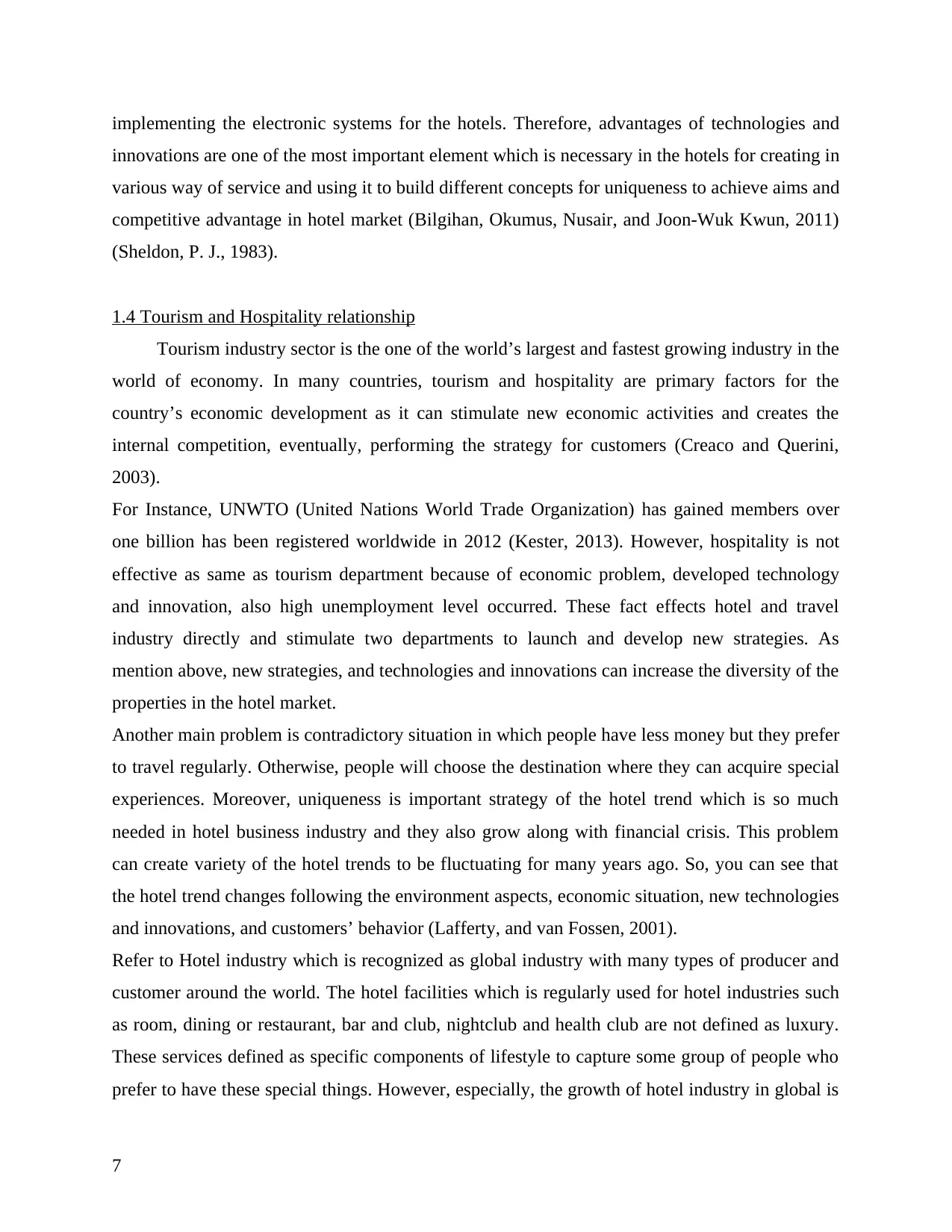
implementing the electronic systems for the hotels. Therefore, advantages of technologies and
innovations are one of the most important element which is necessary in the hotels for creating in
various way of service and using it to build different concepts for uniqueness to achieve aims and
competitive advantage in hotel market (Bilgihan, Okumus, Nusair, and Joon-Wuk Kwun, 2011)
(Sheldon, P. J., 1983).
1.4 Tourism and Hospitality relationship
Tourism industry sector is the one of the world’s largest and fastest growing industry in the
world of economy. In many countries, tourism and hospitality are primary factors for the
country’s economic development as it can stimulate new economic activities and creates the
internal competition, eventually, performing the strategy for customers (Creaco and Querini,
2003).
For Instance, UNWTO (United Nations World Trade Organization) has gained members over
one billion has been registered worldwide in 2012 (Kester, 2013). However, hospitality is not
effective as same as tourism department because of economic problem, developed technology
and innovation, also high unemployment level occurred. These fact effects hotel and travel
industry directly and stimulate two departments to launch and develop new strategies. As
mention above, new strategies, and technologies and innovations can increase the diversity of the
properties in the hotel market.
Another main problem is contradictory situation in which people have less money but they prefer
to travel regularly. Otherwise, people will choose the destination where they can acquire special
experiences. Moreover, uniqueness is important strategy of the hotel trend which is so much
needed in hotel business industry and they also grow along with financial crisis. This problem
can create variety of the hotel trends to be fluctuating for many years ago. So, you can see that
the hotel trend changes following the environment aspects, economic situation, new technologies
and innovations, and customers’ behavior (Lafferty, and van Fossen, 2001).
Refer to Hotel industry which is recognized as global industry with many types of producer and
customer around the world. The hotel facilities which is regularly used for hotel industries such
as room, dining or restaurant, bar and club, nightclub and health club are not defined as luxury.
These services defined as specific components of lifestyle to capture some group of people who
prefer to have these special things. However, especially, the growth of hotel industry in global is
7
innovations are one of the most important element which is necessary in the hotels for creating in
various way of service and using it to build different concepts for uniqueness to achieve aims and
competitive advantage in hotel market (Bilgihan, Okumus, Nusair, and Joon-Wuk Kwun, 2011)
(Sheldon, P. J., 1983).
1.4 Tourism and Hospitality relationship
Tourism industry sector is the one of the world’s largest and fastest growing industry in the
world of economy. In many countries, tourism and hospitality are primary factors for the
country’s economic development as it can stimulate new economic activities and creates the
internal competition, eventually, performing the strategy for customers (Creaco and Querini,
2003).
For Instance, UNWTO (United Nations World Trade Organization) has gained members over
one billion has been registered worldwide in 2012 (Kester, 2013). However, hospitality is not
effective as same as tourism department because of economic problem, developed technology
and innovation, also high unemployment level occurred. These fact effects hotel and travel
industry directly and stimulate two departments to launch and develop new strategies. As
mention above, new strategies, and technologies and innovations can increase the diversity of the
properties in the hotel market.
Another main problem is contradictory situation in which people have less money but they prefer
to travel regularly. Otherwise, people will choose the destination where they can acquire special
experiences. Moreover, uniqueness is important strategy of the hotel trend which is so much
needed in hotel business industry and they also grow along with financial crisis. This problem
can create variety of the hotel trends to be fluctuating for many years ago. So, you can see that
the hotel trend changes following the environment aspects, economic situation, new technologies
and innovations, and customers’ behavior (Lafferty, and van Fossen, 2001).
Refer to Hotel industry which is recognized as global industry with many types of producer and
customer around the world. The hotel facilities which is regularly used for hotel industries such
as room, dining or restaurant, bar and club, nightclub and health club are not defined as luxury.
These services defined as specific components of lifestyle to capture some group of people who
prefer to have these special things. However, especially, the growth of hotel industry in global is
7
Paraphrase This Document
Need a fresh take? Get an instant paraphrase of this document with our AI Paraphraser
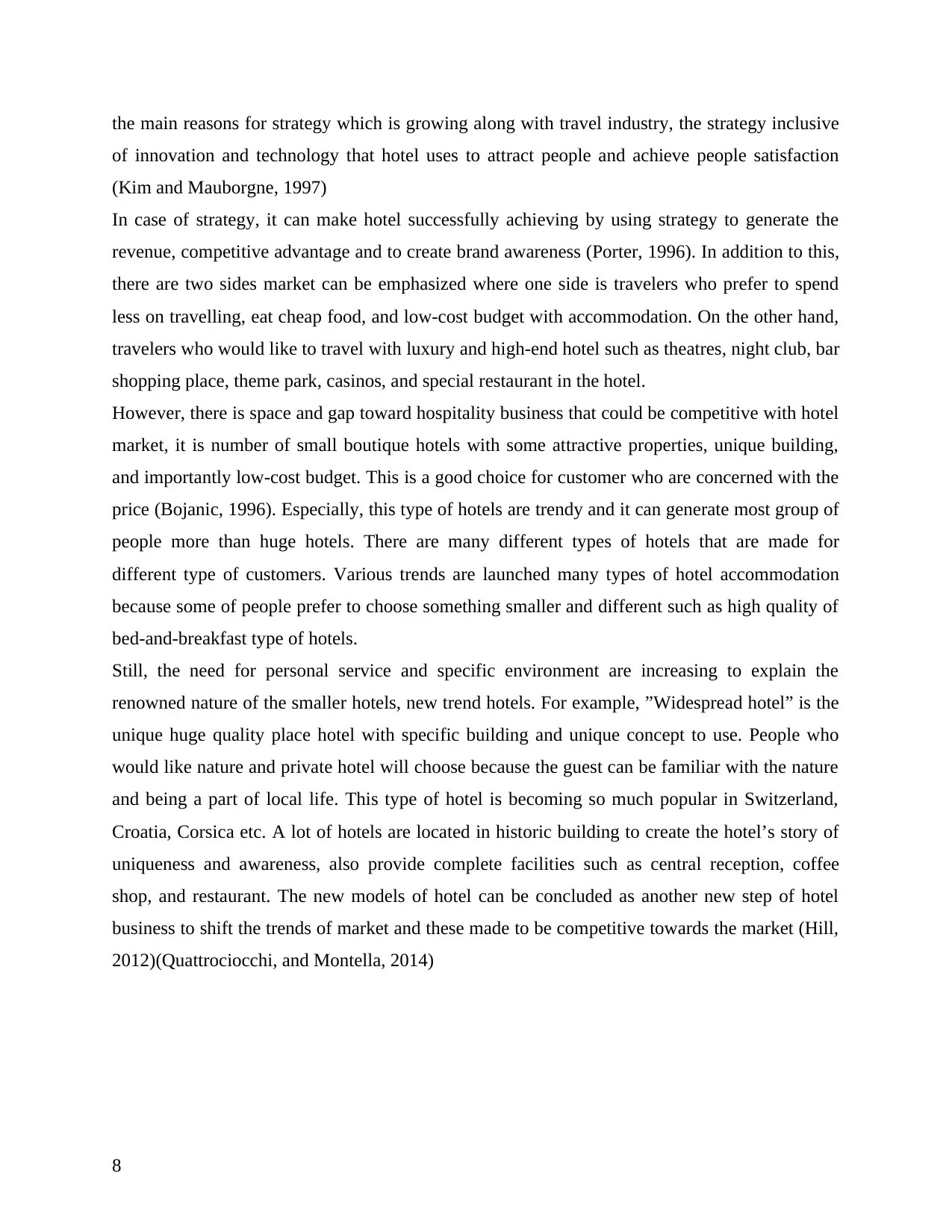
the main reasons for strategy which is growing along with travel industry, the strategy inclusive
of innovation and technology that hotel uses to attract people and achieve people satisfaction
(Kim and Mauborgne, 1997)
In case of strategy, it can make hotel successfully achieving by using strategy to generate the
revenue, competitive advantage and to create brand awareness (Porter, 1996). In addition to this,
there are two sides market can be emphasized where one side is travelers who prefer to spend
less on travelling, eat cheap food, and low-cost budget with accommodation. On the other hand,
travelers who would like to travel with luxury and high-end hotel such as theatres, night club, bar
shopping place, theme park, casinos, and special restaurant in the hotel.
However, there is space and gap toward hospitality business that could be competitive with hotel
market, it is number of small boutique hotels with some attractive properties, unique building,
and importantly low-cost budget. This is a good choice for customer who are concerned with the
price (Bojanic, 1996). Especially, this type of hotels are trendy and it can generate most group of
people more than huge hotels. There are many different types of hotels that are made for
different type of customers. Various trends are launched many types of hotel accommodation
because some of people prefer to choose something smaller and different such as high quality of
bed‐and‐breakfast type of hotels.
Still, the need for personal service and specific environment are increasing to explain the
renowned nature of the smaller hotels, new trend hotels. For example, ”Widespread hotel” is the
unique huge quality place hotel with specific building and unique concept to use. People who
would like nature and private hotel will choose because the guest can be familiar with the nature
and being a part of local life. This type of hotel is becoming so much popular in Switzerland,
Croatia, Corsica etc. A lot of hotels are located in historic building to create the hotel’s story of
uniqueness and awareness, also provide complete facilities such as central reception, coffee
shop, and restaurant. The new models of hotel can be concluded as another new step of hotel
business to shift the trends of market and these made to be competitive towards the market (Hill,
2012)(Quattrociocchi, and Montella, 2014)
8
of innovation and technology that hotel uses to attract people and achieve people satisfaction
(Kim and Mauborgne, 1997)
In case of strategy, it can make hotel successfully achieving by using strategy to generate the
revenue, competitive advantage and to create brand awareness (Porter, 1996). In addition to this,
there are two sides market can be emphasized where one side is travelers who prefer to spend
less on travelling, eat cheap food, and low-cost budget with accommodation. On the other hand,
travelers who would like to travel with luxury and high-end hotel such as theatres, night club, bar
shopping place, theme park, casinos, and special restaurant in the hotel.
However, there is space and gap toward hospitality business that could be competitive with hotel
market, it is number of small boutique hotels with some attractive properties, unique building,
and importantly low-cost budget. This is a good choice for customer who are concerned with the
price (Bojanic, 1996). Especially, this type of hotels are trendy and it can generate most group of
people more than huge hotels. There are many different types of hotels that are made for
different type of customers. Various trends are launched many types of hotel accommodation
because some of people prefer to choose something smaller and different such as high quality of
bed‐and‐breakfast type of hotels.
Still, the need for personal service and specific environment are increasing to explain the
renowned nature of the smaller hotels, new trend hotels. For example, ”Widespread hotel” is the
unique huge quality place hotel with specific building and unique concept to use. People who
would like nature and private hotel will choose because the guest can be familiar with the nature
and being a part of local life. This type of hotel is becoming so much popular in Switzerland,
Croatia, Corsica etc. A lot of hotels are located in historic building to create the hotel’s story of
uniqueness and awareness, also provide complete facilities such as central reception, coffee
shop, and restaurant. The new models of hotel can be concluded as another new step of hotel
business to shift the trends of market and these made to be competitive towards the market (Hill,
2012)(Quattrociocchi, and Montella, 2014)
8
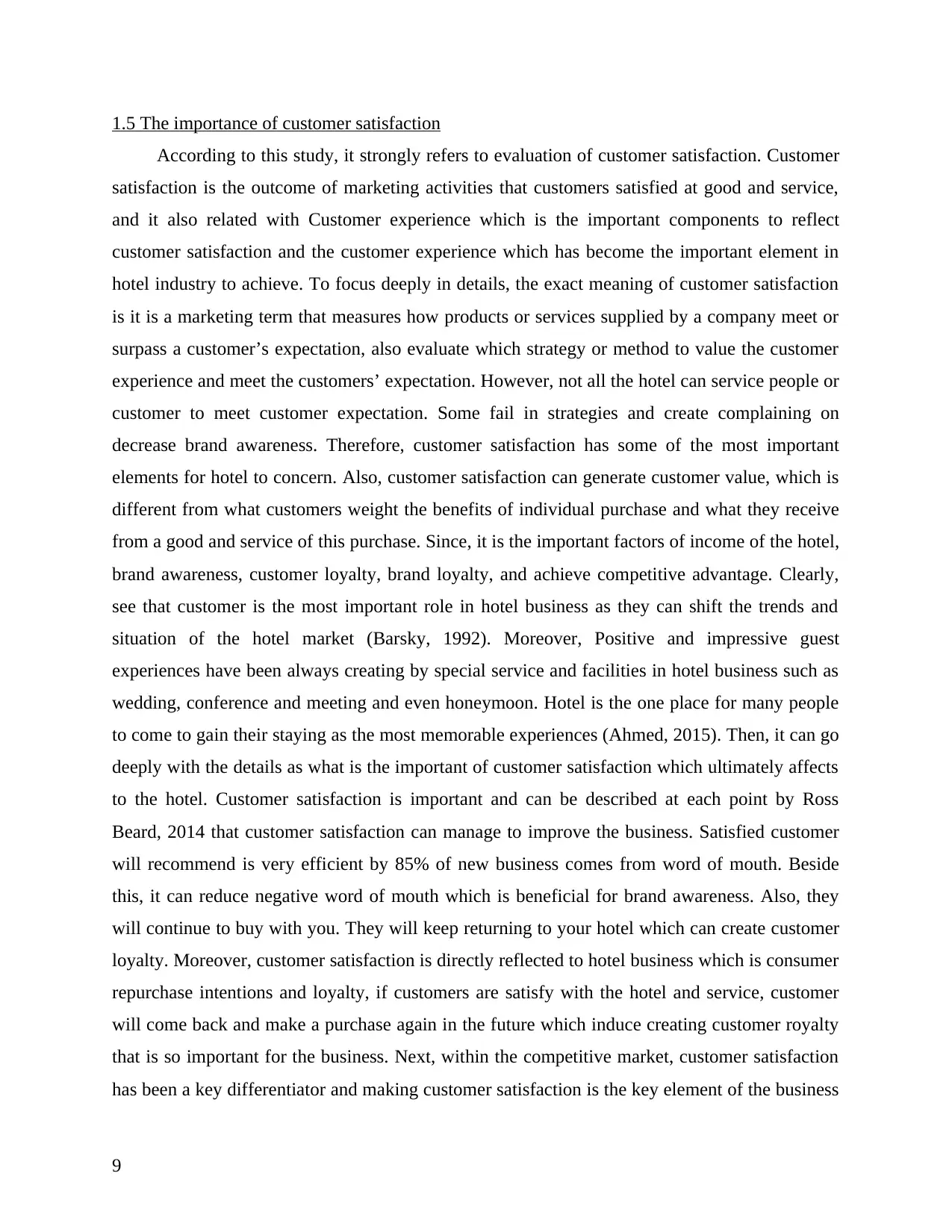
1.5 The importance of customer satisfaction
According to this study, it strongly refers to evaluation of customer satisfaction. Customer
satisfaction is the outcome of marketing activities that customers satisfied at good and service,
and it also related with Customer experience which is the important components to reflect
customer satisfaction and the customer experience which has become the important element in
hotel industry to achieve. To focus deeply in details, the exact meaning of customer satisfaction
is it is a marketing term that measures how products or services supplied by a company meet or
surpass a customer’s expectation, also evaluate which strategy or method to value the customer
experience and meet the customers’ expectation. However, not all the hotel can service people or
customer to meet customer expectation. Some fail in strategies and create complaining on
decrease brand awareness. Therefore, customer satisfaction has some of the most important
elements for hotel to concern. Also, customer satisfaction can generate customer value, which is
different from what customers weight the benefits of individual purchase and what they receive
from a good and service of this purchase. Since, it is the important factors of income of the hotel,
brand awareness, customer loyalty, brand loyalty, and achieve competitive advantage. Clearly,
see that customer is the most important role in hotel business as they can shift the trends and
situation of the hotel market (Barsky, 1992). Moreover, Positive and impressive guest
experiences have been always creating by special service and facilities in hotel business such as
wedding, conference and meeting and even honeymoon. Hotel is the one place for many people
to come to gain their staying as the most memorable experiences (Ahmed, 2015). Then, it can go
deeply with the details as what is the important of customer satisfaction which ultimately affects
to the hotel. Customer satisfaction is important and can be described at each point by Ross
Beard, 2014 that customer satisfaction can manage to improve the business. Satisfied customer
will recommend is very efficient by 85% of new business comes from word of mouth. Beside
this, it can reduce negative word of mouth which is beneficial for brand awareness. Also, they
will continue to buy with you. They will keep returning to your hotel which can create customer
loyalty. Moreover, customer satisfaction is directly reflected to hotel business which is consumer
repurchase intentions and loyalty, if customers are satisfy with the hotel and service, customer
will come back and make a purchase again in the future which induce creating customer royalty
that is so important for the business. Next, within the competitive market, customer satisfaction
has been a key differentiator and making customer satisfaction is the key element of the business
9
According to this study, it strongly refers to evaluation of customer satisfaction. Customer
satisfaction is the outcome of marketing activities that customers satisfied at good and service,
and it also related with Customer experience which is the important components to reflect
customer satisfaction and the customer experience which has become the important element in
hotel industry to achieve. To focus deeply in details, the exact meaning of customer satisfaction
is it is a marketing term that measures how products or services supplied by a company meet or
surpass a customer’s expectation, also evaluate which strategy or method to value the customer
experience and meet the customers’ expectation. However, not all the hotel can service people or
customer to meet customer expectation. Some fail in strategies and create complaining on
decrease brand awareness. Therefore, customer satisfaction has some of the most important
elements for hotel to concern. Also, customer satisfaction can generate customer value, which is
different from what customers weight the benefits of individual purchase and what they receive
from a good and service of this purchase. Since, it is the important factors of income of the hotel,
brand awareness, customer loyalty, brand loyalty, and achieve competitive advantage. Clearly,
see that customer is the most important role in hotel business as they can shift the trends and
situation of the hotel market (Barsky, 1992). Moreover, Positive and impressive guest
experiences have been always creating by special service and facilities in hotel business such as
wedding, conference and meeting and even honeymoon. Hotel is the one place for many people
to come to gain their staying as the most memorable experiences (Ahmed, 2015). Then, it can go
deeply with the details as what is the important of customer satisfaction which ultimately affects
to the hotel. Customer satisfaction is important and can be described at each point by Ross
Beard, 2014 that customer satisfaction can manage to improve the business. Satisfied customer
will recommend is very efficient by 85% of new business comes from word of mouth. Beside
this, it can reduce negative word of mouth which is beneficial for brand awareness. Also, they
will continue to buy with you. They will keep returning to your hotel which can create customer
loyalty. Moreover, customer satisfaction is directly reflected to hotel business which is consumer
repurchase intentions and loyalty, if customers are satisfy with the hotel and service, customer
will come back and make a purchase again in the future which induce creating customer royalty
that is so important for the business. Next, within the competitive market, customer satisfaction
has been a key differentiator and making customer satisfaction is the key element of the business
9
⊘ This is a preview!⊘
Do you want full access?
Subscribe today to unlock all pages.

Trusted by 1+ million students worldwide
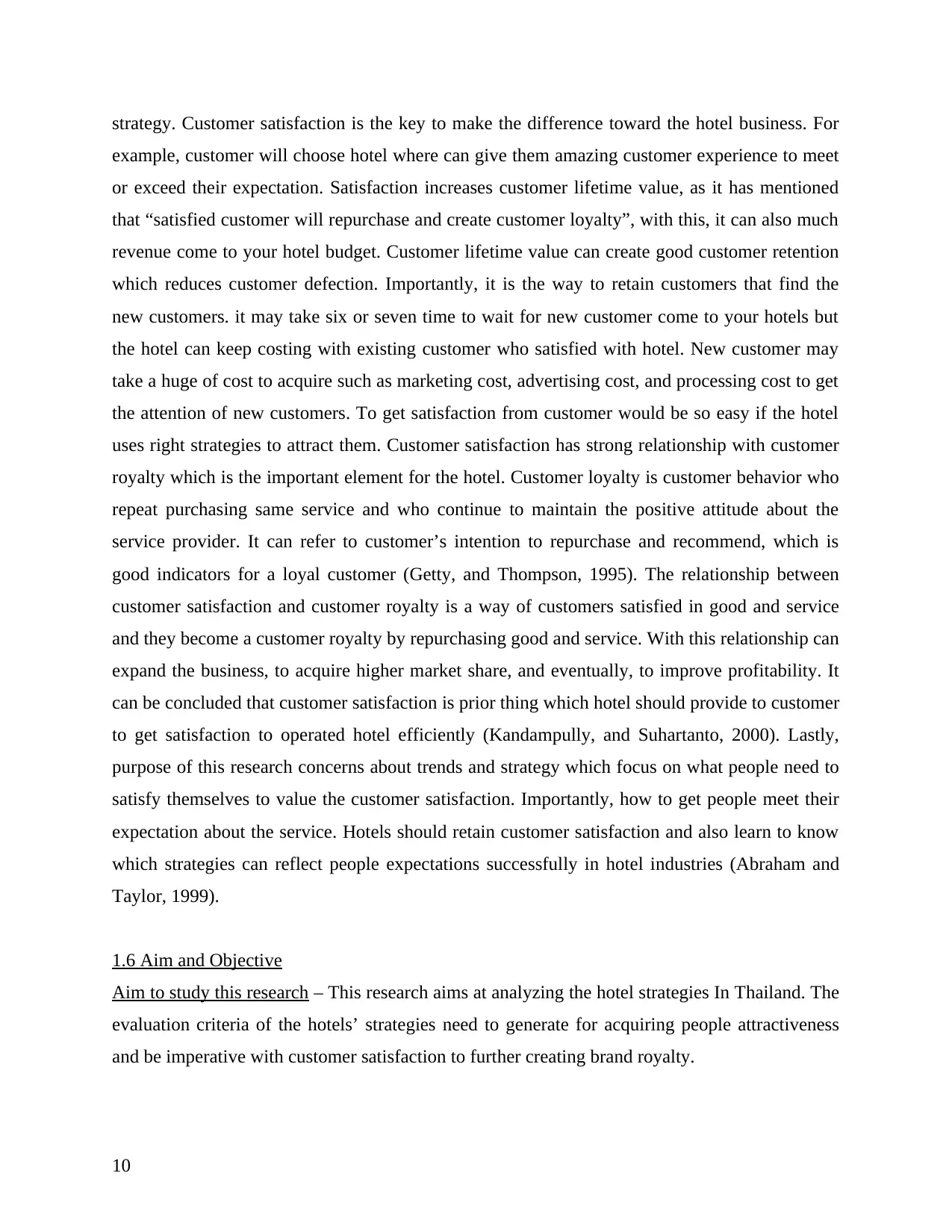
strategy. Customer satisfaction is the key to make the difference toward the hotel business. For
example, customer will choose hotel where can give them amazing customer experience to meet
or exceed their expectation. Satisfaction increases customer lifetime value, as it has mentioned
that “satisfied customer will repurchase and create customer loyalty”, with this, it can also much
revenue come to your hotel budget. Customer lifetime value can create good customer retention
which reduces customer defection. Importantly, it is the way to retain customers that find the
new customers. it may take six or seven time to wait for new customer come to your hotels but
the hotel can keep costing with existing customer who satisfied with hotel. New customer may
take a huge of cost to acquire such as marketing cost, advertising cost, and processing cost to get
the attention of new customers. To get satisfaction from customer would be so easy if the hotel
uses right strategies to attract them. Customer satisfaction has strong relationship with customer
royalty which is the important element for the hotel. Customer loyalty is customer behavior who
repeat purchasing same service and who continue to maintain the positive attitude about the
service provider. It can refer to customer’s intention to repurchase and recommend, which is
good indicators for a loyal customer (Getty, and Thompson, 1995). The relationship between
customer satisfaction and customer royalty is a way of customers satisfied in good and service
and they become a customer royalty by repurchasing good and service. With this relationship can
expand the business, to acquire higher market share, and eventually, to improve profitability. It
can be concluded that customer satisfaction is prior thing which hotel should provide to customer
to get satisfaction to operated hotel efficiently (Kandampully, and Suhartanto, 2000). Lastly,
purpose of this research concerns about trends and strategy which focus on what people need to
satisfy themselves to value the customer satisfaction. Importantly, how to get people meet their
expectation about the service. Hotels should retain customer satisfaction and also learn to know
which strategies can reflect people expectations successfully in hotel industries (Abraham and
Taylor, 1999).
1.6 Aim and Objective
Aim to study this research – This research aims at analyzing the hotel strategies In Thailand. The
evaluation criteria of the hotels’ strategies need to generate for acquiring people attractiveness
and be imperative with customer satisfaction to further creating brand royalty.
10
example, customer will choose hotel where can give them amazing customer experience to meet
or exceed their expectation. Satisfaction increases customer lifetime value, as it has mentioned
that “satisfied customer will repurchase and create customer loyalty”, with this, it can also much
revenue come to your hotel budget. Customer lifetime value can create good customer retention
which reduces customer defection. Importantly, it is the way to retain customers that find the
new customers. it may take six or seven time to wait for new customer come to your hotels but
the hotel can keep costing with existing customer who satisfied with hotel. New customer may
take a huge of cost to acquire such as marketing cost, advertising cost, and processing cost to get
the attention of new customers. To get satisfaction from customer would be so easy if the hotel
uses right strategies to attract them. Customer satisfaction has strong relationship with customer
royalty which is the important element for the hotel. Customer loyalty is customer behavior who
repeat purchasing same service and who continue to maintain the positive attitude about the
service provider. It can refer to customer’s intention to repurchase and recommend, which is
good indicators for a loyal customer (Getty, and Thompson, 1995). The relationship between
customer satisfaction and customer royalty is a way of customers satisfied in good and service
and they become a customer royalty by repurchasing good and service. With this relationship can
expand the business, to acquire higher market share, and eventually, to improve profitability. It
can be concluded that customer satisfaction is prior thing which hotel should provide to customer
to get satisfaction to operated hotel efficiently (Kandampully, and Suhartanto, 2000). Lastly,
purpose of this research concerns about trends and strategy which focus on what people need to
satisfy themselves to value the customer satisfaction. Importantly, how to get people meet their
expectation about the service. Hotels should retain customer satisfaction and also learn to know
which strategies can reflect people expectations successfully in hotel industries (Abraham and
Taylor, 1999).
1.6 Aim and Objective
Aim to study this research – This research aims at analyzing the hotel strategies In Thailand. The
evaluation criteria of the hotels’ strategies need to generate for acquiring people attractiveness
and be imperative with customer satisfaction to further creating brand royalty.
10
Paraphrase This Document
Need a fresh take? Get an instant paraphrase of this document with our AI Paraphraser
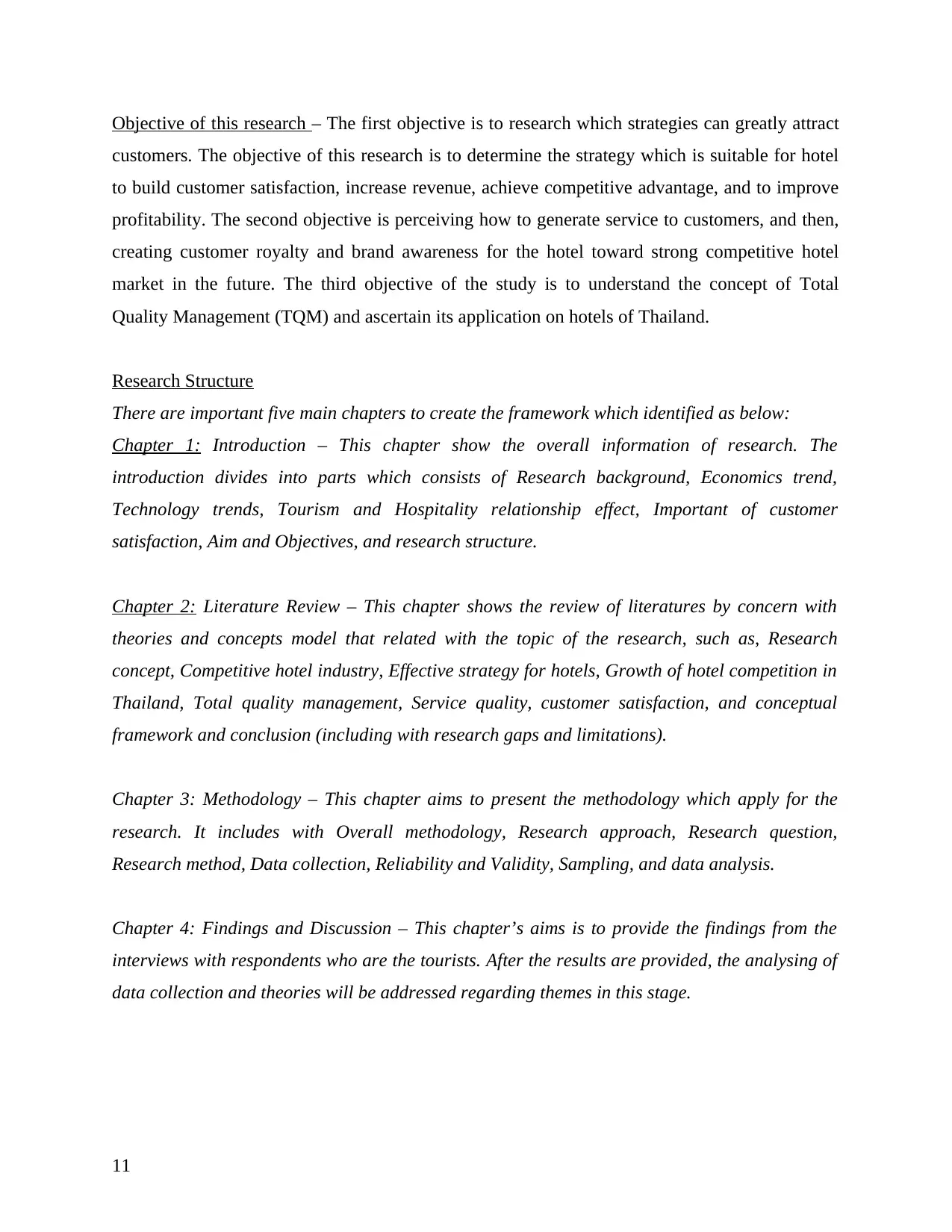
Objective of this research – The first objective is to research which strategies can greatly attract
customers. The objective of this research is to determine the strategy which is suitable for hotel
to build customer satisfaction, increase revenue, achieve competitive advantage, and to improve
profitability. The second objective is perceiving how to generate service to customers, and then,
creating customer royalty and brand awareness for the hotel toward strong competitive hotel
market in the future. The third objective of the study is to understand the concept of Total
Quality Management (TQM) and ascertain its application on hotels of Thailand.
Research Structure
There are important five main chapters to create the framework which identified as below:
Chapter 1: Introduction – This chapter show the overall information of research. The
introduction divides into parts which consists of Research background, Economics trend,
Technology trends, Tourism and Hospitality relationship effect, Important of customer
satisfaction, Aim and Objectives, and research structure.
Chapter 2: Literature Review – This chapter shows the review of literatures by concern with
theories and concepts model that related with the topic of the research, such as, Research
concept, Competitive hotel industry, Effective strategy for hotels, Growth of hotel competition in
Thailand, Total quality management, Service quality, customer satisfaction, and conceptual
framework and conclusion (including with research gaps and limitations).
Chapter 3: Methodology – This chapter aims to present the methodology which apply for the
research. It includes with Overall methodology, Research approach, Research question,
Research method, Data collection, Reliability and Validity, Sampling, and data analysis.
Chapter 4: Findings and Discussion – This chapter’s aims is to provide the findings from the
interviews with respondents who are the tourists. After the results are provided, the analysing of
data collection and theories will be addressed regarding themes in this stage.
11
customers. The objective of this research is to determine the strategy which is suitable for hotel
to build customer satisfaction, increase revenue, achieve competitive advantage, and to improve
profitability. The second objective is perceiving how to generate service to customers, and then,
creating customer royalty and brand awareness for the hotel toward strong competitive hotel
market in the future. The third objective of the study is to understand the concept of Total
Quality Management (TQM) and ascertain its application on hotels of Thailand.
Research Structure
There are important five main chapters to create the framework which identified as below:
Chapter 1: Introduction – This chapter show the overall information of research. The
introduction divides into parts which consists of Research background, Economics trend,
Technology trends, Tourism and Hospitality relationship effect, Important of customer
satisfaction, Aim and Objectives, and research structure.
Chapter 2: Literature Review – This chapter shows the review of literatures by concern with
theories and concepts model that related with the topic of the research, such as, Research
concept, Competitive hotel industry, Effective strategy for hotels, Growth of hotel competition in
Thailand, Total quality management, Service quality, customer satisfaction, and conceptual
framework and conclusion (including with research gaps and limitations).
Chapter 3: Methodology – This chapter aims to present the methodology which apply for the
research. It includes with Overall methodology, Research approach, Research question,
Research method, Data collection, Reliability and Validity, Sampling, and data analysis.
Chapter 4: Findings and Discussion – This chapter’s aims is to provide the findings from the
interviews with respondents who are the tourists. After the results are provided, the analysing of
data collection and theories will be addressed regarding themes in this stage.
11
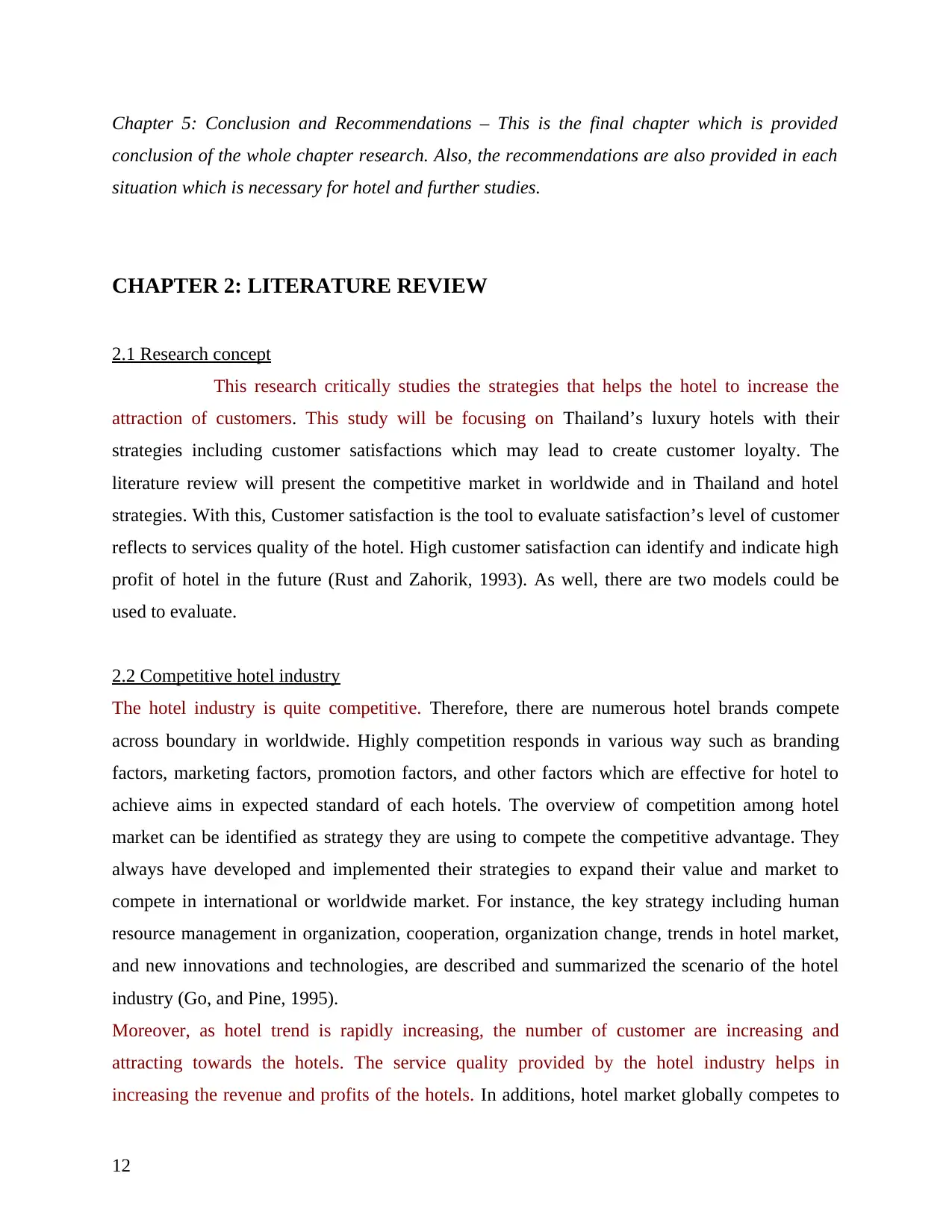
Chapter 5: Conclusion and Recommendations – This is the final chapter which is provided
conclusion of the whole chapter research. Also, the recommendations are also provided in each
situation which is necessary for hotel and further studies.
CHAPTER 2: LITERATURE REVIEW
2.1 Research concept
This research critically studies the strategies that helps the hotel to increase the
attraction of customers. This study will be focusing on Thailand’s luxury hotels with their
strategies including customer satisfactions which may lead to create customer loyalty. The
literature review will present the competitive market in worldwide and in Thailand and hotel
strategies. With this, Customer satisfaction is the tool to evaluate satisfaction’s level of customer
reflects to services quality of the hotel. High customer satisfaction can identify and indicate high
profit of hotel in the future (Rust and Zahorik, 1993). As well, there are two models could be
used to evaluate.
2.2 Competitive hotel industry
The hotel industry is quite competitive. Therefore, there are numerous hotel brands compete
across boundary in worldwide. Highly competition responds in various way such as branding
factors, marketing factors, promotion factors, and other factors which are effective for hotel to
achieve aims in expected standard of each hotels. The overview of competition among hotel
market can be identified as strategy they are using to compete the competitive advantage. They
always have developed and implemented their strategies to expand their value and market to
compete in international or worldwide market. For instance, the key strategy including human
resource management in organization, cooperation, organization change, trends in hotel market,
and new innovations and technologies, are described and summarized the scenario of the hotel
industry (Go, and Pine, 1995).
Moreover, as hotel trend is rapidly increasing, the number of customer are increasing and
attracting towards the hotels. The service quality provided by the hotel industry helps in
increasing the revenue and profits of the hotels. In additions, hotel market globally competes to
12
conclusion of the whole chapter research. Also, the recommendations are also provided in each
situation which is necessary for hotel and further studies.
CHAPTER 2: LITERATURE REVIEW
2.1 Research concept
This research critically studies the strategies that helps the hotel to increase the
attraction of customers. This study will be focusing on Thailand’s luxury hotels with their
strategies including customer satisfactions which may lead to create customer loyalty. The
literature review will present the competitive market in worldwide and in Thailand and hotel
strategies. With this, Customer satisfaction is the tool to evaluate satisfaction’s level of customer
reflects to services quality of the hotel. High customer satisfaction can identify and indicate high
profit of hotel in the future (Rust and Zahorik, 1993). As well, there are two models could be
used to evaluate.
2.2 Competitive hotel industry
The hotel industry is quite competitive. Therefore, there are numerous hotel brands compete
across boundary in worldwide. Highly competition responds in various way such as branding
factors, marketing factors, promotion factors, and other factors which are effective for hotel to
achieve aims in expected standard of each hotels. The overview of competition among hotel
market can be identified as strategy they are using to compete the competitive advantage. They
always have developed and implemented their strategies to expand their value and market to
compete in international or worldwide market. For instance, the key strategy including human
resource management in organization, cooperation, organization change, trends in hotel market,
and new innovations and technologies, are described and summarized the scenario of the hotel
industry (Go, and Pine, 1995).
Moreover, as hotel trend is rapidly increasing, the number of customer are increasing and
attracting towards the hotels. The service quality provided by the hotel industry helps in
increasing the revenue and profits of the hotels. In additions, hotel market globally competes to
12
⊘ This is a preview!⊘
Do you want full access?
Subscribe today to unlock all pages.

Trusted by 1+ million students worldwide
1 out of 71
Related Documents
Your All-in-One AI-Powered Toolkit for Academic Success.
+13062052269
info@desklib.com
Available 24*7 on WhatsApp / Email
![[object Object]](/_next/static/media/star-bottom.7253800d.svg)
Unlock your academic potential
Copyright © 2020–2026 A2Z Services. All Rights Reserved. Developed and managed by ZUCOL.





